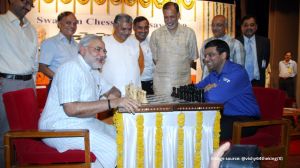The Putin dividend
The importance of President Vladimir Putin's visit and its implications for Indo-Russian relations must be assessed in the context of the ...

The importance of President Vladimir Putin’s visit and its implications for Indo-Russian relations must be assessed in the context of the developing geo-strategic environment. There have been changes in foreign policy orientations, both of Russia and India in the aftermath of the Cold War. Russia is no longer a superpower on a par with the United States. It has, therefore, re-cast its foreign policy.
The overall orientation of Russian foreign policy is Euro-centric and relations with the US is top priority for Russia. Next, Russia needs to preserve its influence in Eastern Europe and Central Asia, in the context of the linkages which the countries in these regions have developed over the last decade with the US and Western Europe. The re-unification of Germany, the Czech Republic and Hungary becoming part of NATO, and NATO’s partnership for peace linkages with Central Asian countries, has generated some concern in Russia.
Russia remains economically dependent on the US and Western Europe. Russia is conscious of the Central Asian Republics vulnerability to the jockeying for influence among West Europe and Turkey on the one hand and Pakistan, Iran and Saudi Arabia on the other. It is equally concerned about the US security plans in the Western Pacific, to deal with potential crises related to Taiwan and China’s territorial claims in South-East Asia. This has resulted in Russia establishing cooperation with China. Overall, India’s strategic importance for Russia stands diminished compared to what it was during the Cold War.
India’s foreign policy also underwent a change in relation to Russia. The previous leverage which India had in structuring overall foreign policy strategies due to the `Soviet’ connection has disappeared. India decided to diversify its relations with the US, Western Europe, Japan and the ASEAN. These became a matter of higher priority compared to Russia. In fact, between 1991 and 1995, India distanced itself from Russia because of the latter’s anxieties to be accepted by the West. This was despite Yeltsin’s visit to Delhi in January 1993.
Between 1996 and 1998, Russia re-acknowledged the importance of its relations with India to balance USA’s strategic postures in the Western Pacific, in arms control and disarmament and in the management of the security environment in South-East Asia. Consequently, Russia expanded its defence cooperation with China and re-emphasised its relations with India. This approach found formal expression during then Russian Foreign Minister Primakov’s visit to India in December 1997. India responded because of its own defence concerns and technology requirements.
Vajpayee has no ideological inclination in his mind-set about Indo-Soviet relations of the past. Putin is not a traditional Soviet politician. He was a competent senior professional of the KGB who believes in the national destiny of Russia and is committed to making Russia a great power. He is an experienced practitioner of realpolitik and is, therefore, conscious that a certain positive equation with China and India are essential to restore and consolidate Russia’s strategic position in world affairs.
India and Russia have signed ten agreements during Putin’s visit. The most important was the declaration of a strategic partnership. The other agreements detail the programmatic follow up the two governments will undertake to enhance bilateral cooperation across the spectrum.
The strategic partnership declaration entails annual summit level meetings of officials dealing with foreign affairs, defence, economy, and energy. Both sides have committed themselves not to participate in any military, political or other arrangements or armed conflicts threatening either side. Russia and India will cooperate in taking counter-measures against international terrorism, separatism, trans-border crimes and trafficking in narcotics. Deeper long-term and diversified Indo-Russian cooperation will be organised in the sphere of metallurgy, fuel and energy, IT and communications.
The most important decisions on expanding Indo-Russian relations relate to defence supplies, technological cooperation or peaceful uses of atomic energy and outer space, and the acknowledgement of a convergence of interests in dealing with Islamic extremism and terrorist violence, with special reference to Afghanistan. The Russian government has agreed to supply T-90 tanks and to their joint production in India; Russia will also supply the SU-30 fighter jets and assist in their production in India. MiG-29K air defence planes and the aircraft carrier Admiral Gorshkov, will be transferred to India. These arrangements will be underpinned by long-term defence technology cooperation.
Bilateral trade is to be expanded from US $1.7 billion to $ 2.5 billion per annum initially. Institutional arrangements for discussions on Afghanistan, cross-border terrorism and narco-crimes have been put in place. Given the Western reservation in providing defence supplies to a nuclear India, these decisions indicate a greater acceptance by Russia of India’s security concerns. Putin’s motivation stems from the urge to create a polycentric world order.
Having detailed the positive aspects of the visit, it is pertinent to avoid euphoria, taking note of the following facts: For Russia, China and the US are higher priorities. Russia has pulled back from the former Soviet position of categorical support to India on the Kashmir issue. There is a parallelism in the US and Russian policies now on Kashmir (as evidenced in discussions of Putin’s special envoy with General Pervez Musharraf last week). While acknowledging that India is a deserving candidate for permanent membership of the UN Security Council, Russia has not announced formal support for India’s candidature for the seat. Russia, even as it has shown a greater understanding of India’s logic of nuclear weaponisation, desires India to fall in line with the international discriminatory non-proliferation agenda.
So it is a more down-to-earth and realistic relationship between the two countries that is envisaged by Putin and Vajpayee. One must acknowledge that Indo-Russian relations are now grounded in more tangible mutuality and equality of interests than Indo-US relations, where we have greater expectations from the US than the US has from us.
While acknowledging that India is a deserving candidate for permanent membership of the UN Security Council, Russia has not announced formal support
Photos



- 01
- 02
- 03
- 04
- 05




























